By Linas Jokubaitis · Tuesday, July 15, 2014 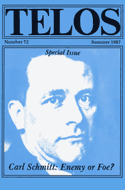 In “The Source of the Tragic,” Carl Schmitt developed an original interpretation of The Tragedy of Hamlet, Prince of Denmark rooted in his sociological understanding of the relationship between art and contemporary politics in Shakespeare’s tragedy. According to the German jurist, one can fully understand and appreciate this masterpiece only by taking into consideration the concrete political situation at the end of the reign of the Tudor dynasty and the intense struggles for legitimacy and authority in which Shakespeare created his theatrical works. In “The Source of the Tragic,” Carl Schmitt developed an original interpretation of The Tragedy of Hamlet, Prince of Denmark rooted in his sociological understanding of the relationship between art and contemporary politics in Shakespeare’s tragedy. According to the German jurist, one can fully understand and appreciate this masterpiece only by taking into consideration the concrete political situation at the end of the reign of the Tudor dynasty and the intense struggles for legitimacy and authority in which Shakespeare created his theatrical works.
Continue reading →
By Lewis West · Tuesday, July 1, 2014 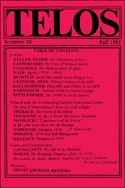 Utopia is necessary: it alone “can rescue a very limited reality” (16). Without it we are shackled by the thoughts of others, confined within realms of possibility defined by those in power. Peace, disarmament—both can seem idealistic, even ridiculous. But our incredulity results not only from the distance of these concepts from the everyday. We have been taught to understand pacifism as impractical, disarmament as suicide. Utopia is necessary: it alone “can rescue a very limited reality” (16). Without it we are shackled by the thoughts of others, confined within realms of possibility defined by those in power. Peace, disarmament—both can seem idealistic, even ridiculous. But our incredulity results not only from the distance of these concepts from the everyday. We have been taught to understand pacifism as impractical, disarmament as suicide.
Continue reading →
By Johannes Grow · Tuesday, June 3, 2014 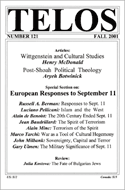 The terrorist attacks on 9/11 created a chain of events that has led not only to the “othering” of Islam and its followers, but also to an increase in the securitization of society as a whole. In “Sovereignty, Empire, Capital, and Terror,” John Milbank examines the aftermath of the 9/11 terrorist attacks, notably the wars in Iraq and Afghanistan and the increasing intervention of governments into the privacy of their respective populations. He questions the wars and the increasingly illiberal turn by the government in regards to dealing with terrorists and criminals and the elimination of due process and, in some cases, habeus corpus. He writes that, “the question that one should ask in response to the immediate aftermath the events of September 11 is why there was outrage on such a gigantic scale” (146). He goes on to identify two reasons: first, the threat against the sovereign, and second, the increasing legitimization by Western governments to intervene in so-called “rogue or failed states,” to ensure the spread of the neoliberal market and prevent the defection of these states from the Western dominated capitalist system. Although there are indeed questions concerning the delineation between national security and the democratic process, the answers to these questions are harder to come by. The terrorist attacks on 9/11 created a chain of events that has led not only to the “othering” of Islam and its followers, but also to an increase in the securitization of society as a whole. In “Sovereignty, Empire, Capital, and Terror,” John Milbank examines the aftermath of the 9/11 terrorist attacks, notably the wars in Iraq and Afghanistan and the increasing intervention of governments into the privacy of their respective populations. He questions the wars and the increasingly illiberal turn by the government in regards to dealing with terrorists and criminals and the elimination of due process and, in some cases, habeus corpus. He writes that, “the question that one should ask in response to the immediate aftermath the events of September 11 is why there was outrage on such a gigantic scale” (146). He goes on to identify two reasons: first, the threat against the sovereign, and second, the increasing legitimization by Western governments to intervene in so-called “rogue or failed states,” to ensure the spread of the neoliberal market and prevent the defection of these states from the Western dominated capitalist system. Although there are indeed questions concerning the delineation between national security and the democratic process, the answers to these questions are harder to come by.
Continue reading →
By Aaron Bell · Tuesday, May 20, 2014 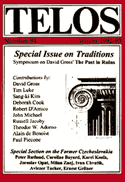 It is hard to imagine what Adorno’s corpus would look like without the deep scars left by his period of exile in the United States during the Second World War. Despite its catastrophic genesis, his exile played a constitutive role in the development of his thought, and made him, among many other things, a savagely insightful commentator on American life. This commentary on America is marked by a dialectic of fascination and disgust with his newfound home, perhaps the most “radically bourgeois country” (75) in the Western world. In particular, he was fascinated by America’s lack of cultural tradition. In his essay “On Tradition,” America serves as a model of a society ravaged by bourgeois rationalization, proudly celebrating its lack of tradition by rejecting “old world” values as archaic, irrational, and pompous. The relatively short history of the nation compounds the problem, further disconnecting us from any substantial sense of tradition or historical consciousness. We are proudly the country of the nouveau riche, possessed of power and wealth bereft of tradition and culture. This literal lack of history and evaluative rejection of tradition places America at ground zero of the crisis of tradition. Tradition survives in America in its most degraded and mutilated forms, manufactured in artificially aged consumer products and conservative “traditional” family values. The recent wave of gauche typographical décor emblazoned with the actual word “TRADITION” seems designed to confirm Adorno’s worst accusations. It is hard to imagine what Adorno’s corpus would look like without the deep scars left by his period of exile in the United States during the Second World War. Despite its catastrophic genesis, his exile played a constitutive role in the development of his thought, and made him, among many other things, a savagely insightful commentator on American life. This commentary on America is marked by a dialectic of fascination and disgust with his newfound home, perhaps the most “radically bourgeois country” (75) in the Western world. In particular, he was fascinated by America’s lack of cultural tradition. In his essay “On Tradition,” America serves as a model of a society ravaged by bourgeois rationalization, proudly celebrating its lack of tradition by rejecting “old world” values as archaic, irrational, and pompous. The relatively short history of the nation compounds the problem, further disconnecting us from any substantial sense of tradition or historical consciousness. We are proudly the country of the nouveau riche, possessed of power and wealth bereft of tradition and culture. This literal lack of history and evaluative rejection of tradition places America at ground zero of the crisis of tradition. Tradition survives in America in its most degraded and mutilated forms, manufactured in artificially aged consumer products and conservative “traditional” family values. The recent wave of gauche typographical décor emblazoned with the actual word “TRADITION” seems designed to confirm Adorno’s worst accusations.
Continue reading →
By Matt Applegate · Tuesday, May 6, 2014 As an occasional feature on TELOSscope, we highlight a past Telos article whose critical insights continue to illuminate our thinking and challenge our assumptions. Today, Matt Applegate looks at Arshi Pipa’s “Gramsci as a (Non) Literary Critic” from Telos 57 (Fall 1983).
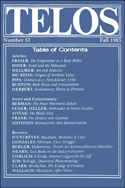 Arshi Pipa’s “Gramsci as a (Non) Literary Critic” is more than a short biography and description of Antonio Gramsci’s inquiries into literary criticism. It also provokes the reader to meditate on the political conditions of literary criticism as an intellectual practice. Gramsci is a controversial figure in the history of literary criticism for at least two reasons, according to Pipa. First, his political work remains more prominent than his literary criticism. When one thinks of Gramsci as a writer and historical figure, his literary criticism might not even register, given his political writing and influence. Second, Gramsci’s politics serve as the impetus for his intellectual projects, thus also providing potential grounds to dismiss or ignore his aesthetic analyses. To be sure, Gramsci is a controversial political figure. In 1921 Gramsci co-founded and led the Communist Party of Italy in opposition to fascism, and was later arrested by fascist police under Mussolini, ultimately dying in prison in 1937. Perhaps his most famous collection of writings, Prison Notebooks, was completed while he was incarcerated between 1926 and 1937. Yet, it is precisely Gramsci’s controversial style and political will that draw Pipa to his work and allow him to question literary criticism as an enduring intellectual practice. Arshi Pipa’s “Gramsci as a (Non) Literary Critic” is more than a short biography and description of Antonio Gramsci’s inquiries into literary criticism. It also provokes the reader to meditate on the political conditions of literary criticism as an intellectual practice. Gramsci is a controversial figure in the history of literary criticism for at least two reasons, according to Pipa. First, his political work remains more prominent than his literary criticism. When one thinks of Gramsci as a writer and historical figure, his literary criticism might not even register, given his political writing and influence. Second, Gramsci’s politics serve as the impetus for his intellectual projects, thus also providing potential grounds to dismiss or ignore his aesthetic analyses. To be sure, Gramsci is a controversial political figure. In 1921 Gramsci co-founded and led the Communist Party of Italy in opposition to fascism, and was later arrested by fascist police under Mussolini, ultimately dying in prison in 1937. Perhaps his most famous collection of writings, Prison Notebooks, was completed while he was incarcerated between 1926 and 1937. Yet, it is precisely Gramsci’s controversial style and political will that draw Pipa to his work and allow him to question literary criticism as an enduring intellectual practice.
Continue reading →
By Aaron Bell · Wednesday, April 23, 2014 As an occasional feature on TELOSscope, we highlight a past Telos article whose critical insights continue to illuminate our thinking and challenge our assumptions. Today, Aaron Bell looks at Theodor W. Adorno’s “Resignation” from Telos 35 (Spring 1978).
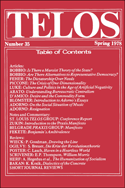 Reading “Resignation” today, it is immediately clear that the historical context is necessary to fully grasp the significance of Adorno’s words. Originally delivered as a radio address in 1968, “Resignation” is, among other things, an important entry in the Marxist theory-praxis debate and a primary document in the history of Adorno’s troubled relationship with the radical student movements of postwar Germany. Adorno, responding directly to the Frankfurt School’s critics of the radical left, defends his refusal to translate Critical Theory into a program for political action. Against the charge of apolitical “resignation,” Adorno articulates a defiant vision of critical thought beholden to no master. This vision of critical thought remains vital today, despite the dated trappings of the theory-praxis debate and the limited interest in Adorno’s biography and the politics of postwar Germany. Reading “Resignation” today, it is immediately clear that the historical context is necessary to fully grasp the significance of Adorno’s words. Originally delivered as a radio address in 1968, “Resignation” is, among other things, an important entry in the Marxist theory-praxis debate and a primary document in the history of Adorno’s troubled relationship with the radical student movements of postwar Germany. Adorno, responding directly to the Frankfurt School’s critics of the radical left, defends his refusal to translate Critical Theory into a program for political action. Against the charge of apolitical “resignation,” Adorno articulates a defiant vision of critical thought beholden to no master. This vision of critical thought remains vital today, despite the dated trappings of the theory-praxis debate and the limited interest in Adorno’s biography and the politics of postwar Germany.
Continue reading →
|
|
 In “The Source of the Tragic,” Carl Schmitt developed an original interpretation of The Tragedy of Hamlet, Prince of Denmark rooted in his sociological understanding of the relationship between art and contemporary politics in Shakespeare’s tragedy. According to the German jurist, one can fully understand and appreciate this masterpiece only by taking into consideration the concrete political situation at the end of the reign of the Tudor dynasty and the intense struggles for legitimacy and authority in which Shakespeare created his theatrical works.
In “The Source of the Tragic,” Carl Schmitt developed an original interpretation of The Tragedy of Hamlet, Prince of Denmark rooted in his sociological understanding of the relationship between art and contemporary politics in Shakespeare’s tragedy. According to the German jurist, one can fully understand and appreciate this masterpiece only by taking into consideration the concrete political situation at the end of the reign of the Tudor dynasty and the intense struggles for legitimacy and authority in which Shakespeare created his theatrical works.  Utopia is necessary: it alone “can rescue a very limited reality” (16). Without it we are shackled by the thoughts of others, confined within realms of possibility defined by those in power. Peace, disarmament—both can seem idealistic, even ridiculous. But our incredulity results not only from the distance of these concepts from the everyday. We have been taught to understand pacifism as impractical, disarmament as suicide.
Utopia is necessary: it alone “can rescue a very limited reality” (16). Without it we are shackled by the thoughts of others, confined within realms of possibility defined by those in power. Peace, disarmament—both can seem idealistic, even ridiculous. But our incredulity results not only from the distance of these concepts from the everyday. We have been taught to understand pacifism as impractical, disarmament as suicide.  The terrorist attacks on 9/11 created a chain of events that has led not only to the “othering” of Islam and its followers, but also to an increase in the securitization of society as a whole. In “Sovereignty, Empire, Capital, and Terror,” John Milbank examines the aftermath of the 9/11 terrorist attacks, notably the wars in Iraq and Afghanistan and the increasing intervention of governments into the privacy of their respective populations. He questions the wars and the increasingly illiberal turn by the government in regards to dealing with terrorists and criminals and the elimination of due process and, in some cases, habeus corpus. He writes that, “the question that one should ask in response to the immediate aftermath the events of September 11 is why there was outrage on such a gigantic scale” (146). He goes on to identify two reasons: first, the threat against the sovereign, and second, the increasing legitimization by Western governments to intervene in so-called “rogue or failed states,” to ensure the spread of the neoliberal market and prevent the defection of these states from the Western dominated capitalist system. Although there are indeed questions concerning the delineation between national security and the democratic process, the answers to these questions are harder to come by.
The terrorist attacks on 9/11 created a chain of events that has led not only to the “othering” of Islam and its followers, but also to an increase in the securitization of society as a whole. In “Sovereignty, Empire, Capital, and Terror,” John Milbank examines the aftermath of the 9/11 terrorist attacks, notably the wars in Iraq and Afghanistan and the increasing intervention of governments into the privacy of their respective populations. He questions the wars and the increasingly illiberal turn by the government in regards to dealing with terrorists and criminals and the elimination of due process and, in some cases, habeus corpus. He writes that, “the question that one should ask in response to the immediate aftermath the events of September 11 is why there was outrage on such a gigantic scale” (146). He goes on to identify two reasons: first, the threat against the sovereign, and second, the increasing legitimization by Western governments to intervene in so-called “rogue or failed states,” to ensure the spread of the neoliberal market and prevent the defection of these states from the Western dominated capitalist system. Although there are indeed questions concerning the delineation between national security and the democratic process, the answers to these questions are harder to come by.  It is hard to imagine what Adorno’s corpus would look like without the deep scars left by his period of exile in the United States during the Second World War. Despite its catastrophic genesis, his exile played a constitutive role in the development of his thought, and made him, among many other things, a savagely insightful commentator on American life. This commentary on America is marked by a dialectic of fascination and disgust with his newfound home, perhaps the most “radically bourgeois country” (75) in the Western world. In particular, he was fascinated by America’s lack of cultural tradition. In his essay “On Tradition,” America serves as a model of a society ravaged by bourgeois rationalization, proudly celebrating its lack of tradition by rejecting “old world” values as archaic, irrational, and pompous. The relatively short history of the nation compounds the problem, further disconnecting us from any substantial sense of tradition or historical consciousness. We are proudly the country of the nouveau riche, possessed of power and wealth bereft of tradition and culture. This literal lack of history and evaluative rejection of tradition places America at ground zero of the crisis of tradition. Tradition survives in America in its most degraded and mutilated forms, manufactured in artificially aged consumer products and conservative “traditional” family values. The recent wave of gauche typographical décor emblazoned with the actual word “TRADITION” seems designed to confirm Adorno’s worst accusations.
It is hard to imagine what Adorno’s corpus would look like without the deep scars left by his period of exile in the United States during the Second World War. Despite its catastrophic genesis, his exile played a constitutive role in the development of his thought, and made him, among many other things, a savagely insightful commentator on American life. This commentary on America is marked by a dialectic of fascination and disgust with his newfound home, perhaps the most “radically bourgeois country” (75) in the Western world. In particular, he was fascinated by America’s lack of cultural tradition. In his essay “On Tradition,” America serves as a model of a society ravaged by bourgeois rationalization, proudly celebrating its lack of tradition by rejecting “old world” values as archaic, irrational, and pompous. The relatively short history of the nation compounds the problem, further disconnecting us from any substantial sense of tradition or historical consciousness. We are proudly the country of the nouveau riche, possessed of power and wealth bereft of tradition and culture. This literal lack of history and evaluative rejection of tradition places America at ground zero of the crisis of tradition. Tradition survives in America in its most degraded and mutilated forms, manufactured in artificially aged consumer products and conservative “traditional” family values. The recent wave of gauche typographical décor emblazoned with the actual word “TRADITION” seems designed to confirm Adorno’s worst accusations.  Arshi Pipa’s “Gramsci as a (Non) Literary Critic” is more than a short biography and description of Antonio Gramsci’s inquiries into literary criticism. It also provokes the reader to meditate on the political conditions of literary criticism as an intellectual practice. Gramsci is a controversial figure in the history of literary criticism for at least two reasons, according to Pipa. First, his political work remains more prominent than his literary criticism. When one thinks of Gramsci as a writer and historical figure, his literary criticism might not even register, given his political writing and influence. Second, Gramsci’s politics serve as the impetus for his intellectual projects, thus also providing potential grounds to dismiss or ignore his aesthetic analyses. To be sure, Gramsci is a controversial political figure. In 1921 Gramsci co-founded and led the Communist Party of Italy in opposition to fascism, and was later arrested by fascist police under Mussolini, ultimately dying in prison in 1937. Perhaps his most famous collection of writings, Prison Notebooks, was completed while he was incarcerated between 1926 and 1937. Yet, it is precisely Gramsci’s controversial style and political will that draw Pipa to his work and allow him to question literary criticism as an enduring intellectual practice.
Arshi Pipa’s “Gramsci as a (Non) Literary Critic” is more than a short biography and description of Antonio Gramsci’s inquiries into literary criticism. It also provokes the reader to meditate on the political conditions of literary criticism as an intellectual practice. Gramsci is a controversial figure in the history of literary criticism for at least two reasons, according to Pipa. First, his political work remains more prominent than his literary criticism. When one thinks of Gramsci as a writer and historical figure, his literary criticism might not even register, given his political writing and influence. Second, Gramsci’s politics serve as the impetus for his intellectual projects, thus also providing potential grounds to dismiss or ignore his aesthetic analyses. To be sure, Gramsci is a controversial political figure. In 1921 Gramsci co-founded and led the Communist Party of Italy in opposition to fascism, and was later arrested by fascist police under Mussolini, ultimately dying in prison in 1937. Perhaps his most famous collection of writings, Prison Notebooks, was completed while he was incarcerated between 1926 and 1937. Yet, it is precisely Gramsci’s controversial style and political will that draw Pipa to his work and allow him to question literary criticism as an enduring intellectual practice.  Reading “Resignation” today, it is immediately clear that the historical context is necessary to fully grasp the significance of Adorno’s words. Originally delivered as a radio address in 1968, “Resignation” is, among other things, an important entry in the Marxist theory-praxis debate and a primary document in the history of Adorno’s troubled relationship with the radical student movements of postwar Germany. Adorno, responding directly to the Frankfurt School’s critics of the radical left, defends his refusal to translate Critical Theory into a program for political action. Against the charge of apolitical “resignation,” Adorno articulates a defiant vision of critical thought beholden to no master. This vision of critical thought remains vital today, despite the dated trappings of the theory-praxis debate and the limited interest in Adorno’s biography and the politics of postwar Germany.
Reading “Resignation” today, it is immediately clear that the historical context is necessary to fully grasp the significance of Adorno’s words. Originally delivered as a radio address in 1968, “Resignation” is, among other things, an important entry in the Marxist theory-praxis debate and a primary document in the history of Adorno’s troubled relationship with the radical student movements of postwar Germany. Adorno, responding directly to the Frankfurt School’s critics of the radical left, defends his refusal to translate Critical Theory into a program for political action. Against the charge of apolitical “resignation,” Adorno articulates a defiant vision of critical thought beholden to no master. This vision of critical thought remains vital today, despite the dated trappings of the theory-praxis debate and the limited interest in Adorno’s biography and the politics of postwar Germany. 

